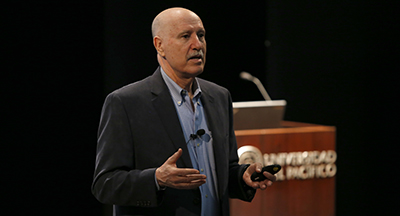Address: Graduate School of the Universidad del Pacífico
Last Tuesday, April 14, Yossi Sheffi, the renowned Director of the Center for Transportation and Logistics of the Massachusetts Institute of Technology (MIT) held his International Conference The Competitive Advantage Of A Logistics Cluster, organized by the Graduate School of the University del Pacífico under the auspices of Yobel SCM, Approlog, Logista and tgestiona. Operate like a small company, but have the benefits of the big ones. That’s the potential of bringing companies together in a logistics cluster, according to Yossi Sheffi.
These opening words were given at his international conference: The competitive advantage of a logistics cluster.During his presentation, Sheffi detailed the importance of developing these logistics conglomerates to enhance qualified workforce, optimize work with suppliers, reduce costs of transport, generate opportunities for collaboration and intercede in the passing of laws for its operation Sheffi mentioned Singapore, Holland, Zaragoza, Memphis, Panama and Jolliet as examples of logistics clusters.
But he stopped to testify his experience in PLAZA, Zaragoza’s logistics platform, where he had the privilege of participating in its development. Sheffi was the one who founded, through the MIT, the Zaragoza Logistics Center within the same PLAZA, obtaining in situ an academic, governmental and industrial association to promote the development of the referred cluster. Collaboration and employment: Based on this experience, Sheffi, author of the book Logistics Clusters: Providing Value and Boosting Growth, highlighted the potential for collaboration between the companies in a cluster, using the Caladero fishery and Zara textile as an example. they share air transport for their logistics activities in Zaragoza.
He also emphasized the generation of quality employment in the clusters, where there is a demand for professionals specialized in information technology, technical repair services and industry.
The Sheffi exhibition sparked a panel conversation between four experts from the Master of Supply Chain Management (SCM) at the University of the Pacific. Francisco D Angelo, executive vice president of Yobel, said that in Peru, clusters of reverse logistics, cold chains, footwear manufacturing and mining can be created. More specifically, Enrique Alania – Antamina’s logistics manager – commented that in Arequipa a natural cluster for the maintenance and distribution of the mining sector has been set up, due to the proliferation of mines in the south. Jaime Sánchez, president of APPROLOG, added that the new cluster in the country is being configured in Lurín, where companies and logistics operators are moving.
This scenario will generate more need for skilled labor. For his part, Rafael Farromeque, director of the SCM Master’s program at the Universidad del Pacífico, showed a table with the World Bank’s logistics performance index, which shows a lag between the countries with the greatest logistics development and Latin America, a gap that urgently needs to be addressed through the development of clusters. The conference was aimed at professionals from the main companies in the country’s logistics sector and graduates of the Graduate School of Universidad del Pacífico, who seek to adopt new approaches and best practices of logistics clusters for the management of the supply chain of their companies.
Yobel SCM participated as a sponsor of the conference, which is an opportunity to show your support as an expert in Supply Chain Management. To see the development of the conference, you can go to News / Links, within the Yobel website, and look for the link: International Conference The competitive advantage of a logistics cluster.


0 Comments